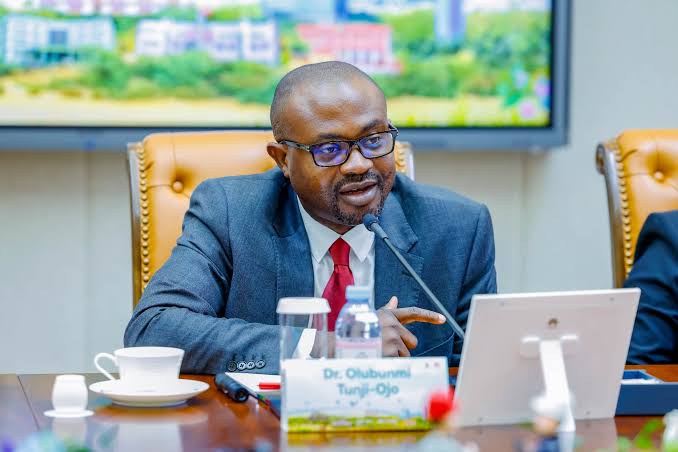/ News
Views: 341
Tunji-Ojo unveils 24-Hour passport printing hub, promises end to backlogs

The struggle for Nigerian passports has long been marked by delays, inefficiency, and frustration for applicants. Now, the Minister of Interior, Dr. Olubunmi Tunji-Ojo, says the newly completed Data Personalization Centre at the Nigeria Immigration Service (NIS) headquarters in Abuja is set to change that.
Describing the facility as a “game-changer” in the nation’s passport production system, the minister explained that it will reduce response time significantly, with passports now printed within 24 hours and delivered within a week.
According to him, this marks the first time since the establishment of the NIS in 1963 that Nigeria will run a centralized passport personalization system comparable to those in countries like the United States, United Kingdom, France, and India. The previous arrangement, he said, relied on about 96 scattered centres across Nigeria and abroad, a model he called “vulnerable and inefficient.”
“Centralization is global best practice because it ensures higher quality, better control, and greater efficiency. We promised Nigerians that we would centralize passport personalization and production, and I am pleased to announce that this project is now 100 percent ready,” Tunji-Ojo stated.
The centre also introduces a major boost in capacity. While the old machines produced only 250–300 passports per machine daily, the new system can reportedly generate about 1,000 passports per hour, giving the NIS the ability to process 4,500-5,000 passports in a normal workday.
“This means applicants whose requests are approved can now expect their passports to be printed within 24 hours,” the minister assured. For applicants weary of long waits, this pledge could mark a dramatic shift though many will be watching closely to see if the system works as promised.
Tunji-Ojo also highlighted other reforms, including the unification of Nigeria’s two passport series into a single regime, implemented with the support of technical partner Iris Smart Technologies. In addition, Nigeria has now fully migrated to the International Civil Aviation Organization’s Public Key Directory, a system that authenticates travel documents globally. “With this, the integrity and global credibility of our passport have been significantly strengthened,” he said.
He reminded Nigerians that the government inherited a staggering 204,000 application backlog, but stressed that the new system will prevent such crises from recurring by automating personalization and reducing human intervention. “This project ensures that the era of backlogs is over. Officers no longer have to work round-the-clock to clear piles of applications. The system is now seamless, fast, and accountable,” he claimed.
The minister expressed gratitude to President Bola Tinubu, the Permanent Secretary of the Ministry of Interior, the Comptroller-General of Immigration, and the NIS’s technical partners for their support in bringing the project to life.
Still, for a country where past reforms have often collapsed under corruption, inefficiency, and entrenched bottlenecks, the new facility will have to prove its worth not just in Abuja, but across every passport office where citizens continue to face delays. For now, Nigerians will take Tunji-Ojo for his word cautiously hopeful that this time, the promises might finally match reality.